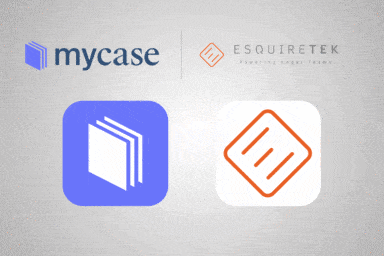Securely Collaborate and Communicate Remotely: A How-To for Lawyers
By Nicole Black

Communicating and collaborating effectively and confidentially has always been an important part of practicing law. After all, the better you communicate with your fellow lawyers, staff, and clients about their cases, the more streamlined your work processes will be. But when faced with the uncertainty of current events, setting up a remote office that enables you to keep your colleagues and clients in the loop isn’t just a good idea, it’s necessary to keep your law firm up and running.
The good news is that today’s lawyers have more choices than ever when it comes to sharing updates and collaborating with clients remotely. The key is to carefully and thoughtfully choose digital communication tools that are conducive to efficient online collaboration, while also sufficiently protecting client confidentiality.
The ethics of secure communication
Lawyers have an ethical obligation to ensure client confidentiality. This means that reasonable steps must be taken to ensure that all confidential communications are secure and protected from prying eyes. Not surprisingly, as technology has evolved, so too have understandings regarding which methods of electronic communication were sufficiently secure.
For example, in the mid-1990s, bar association ethics committees across the country began to approve the use of unencrypted email when communicating with clients and for nearly two decades lawyers used email to communicate with clients since no other more secure methods were available. But most ethics opinions acknowledged that the standard established was an elastic one that could conceivably change as technology advanced and more secure options became available.
Since then, technology has improved significantly, and more secure electronic communication methods have emerged, rendering unencrypted email insufficient for certain types of client communication, as the ABA acknowledged in Formal Opinion 477 last year. In this opinion, the Ethics Committee concluded that unencrypted email may not always be sufficient for client communication.
Specifically, the Committee advised that lawyers must assess the sensitivity of information on a case-by-case basis and then choose the most appropriate and sufficiently secure method of communicating and collaborating with clients. Options offered in the opinion included encrypted email and “the use of a Virtual Private Network, or another secure internet portal.”
The online communications portal solution
Online portals offer a secure and effective communication option for lawyers seeking to avoid email altogether. These portals are often built into law practice management platforms and offer a host of benefits, with security being just one of them. With online portals you can communicate and share case-related information with your colleagues and clients, all in one convenient, secure location. The cumbersome back and forth process of unsecure, threaded emails is a thing of the past and is instead replaced by the ability to securely communicate in an encrypted, controlled online environment.
The benefits of online portals are many:
-
-
- Superior security
- Easily accessible via a direct link from any internet-enabled device
- Built-in ability to share information and documents
- Enhanced communication capabilities and threaded, easy-to-read discussions
- Streamlined communication and collaboration increases efficiency
- 24/7 convenient access to information.
-
Another benefit of particular interest to lawyers is the ability to track and view all client communications. Online portals provide visibility into all communications, making it easy to see who interacted with the client, how often communications occurred, what was said, and when. In other words, for law firms, client portals are an ideal communications solution.
Choose the right portal technology for your firm
Of course, choosing the right online portal tool for your law firm is key. That’s why it’s important to carefully vet the provider that offers these tools, which is more often than not for law firms a law practice management software company.
When choosing a law practice management provider whose software includes communications tools, there are a number of areas to focus on in order to ensure that you choose the right software program for your firm. Here are a few tips to help guide your selection process:
- Make sure to demo the software and take advantage of any free trials offered
- Have a thorough understanding of the features that are most important to your firm
- Ensure that the software is intuitive and efficient
- Test drive the communication features
- Make sure the portal includes the ability to invoice and receive client payments.
Implementing communications portals in your firm
Last but not least, it’s important to ensure that firm employees and your clients are fully on board and understand how to make the most of the portal. You’ve invested in a time-saving tool for your law firm, but it will go to waste if no one takes advantage of it.
For your firm’s employees, make sure that they understand the features of the software and how to integrate the portal into their workflows. Provide them with guidelines designed to help them implement the portal into their daily routine. Rest assured, the time spent at the outset to educate them about the benefits and features of the portal will pay off tremendously in the long run and help your firm realize the value of its investment.
With clients, it’s important to encourage portal use at the very start of each case. Explain how the portal will benefit them, stressing the security features, the ease of use, and 24/7 access to case-related information. Provide them with a guide that showcases the main features of the portal and explains how to use it. Don’t mandate use of the portal, but emphasize that if the portal isn’t used for communication, response time will necessarily be slower. Finally, encourage them to dive in and use it, while stressing that the portal is for their benefit and is easy-to-use and convenient.
Online communication portals are intuitive, efficient, and secure. Once your clients and employees login and are able to easily access and share information, they’ll quickly realize the value of using it to communicate. You might just be surprised at how quickly they adapt to it! And then, before you know it, your law firm will be well on its way to taking advantage of the many benefits that client portals have to offer.
So if you’ve been searching for the best way to securely communicate and collaborate remotely, look no further. Online portals are the perfect solution for law firms seeking a secure 21st century communication tool for remote working.
Interested in learning more about online portals and effective client communication? Make sure to download our FREE guide “Fixing the Communication Problem: Tips for Providing Exceptional Client Communication.”


